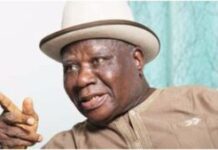Members of the House of Representatives Committee on the review of the 1999 Constitution recently came up with an outlandish proposal for the creation of additional 31 states in the country. The committee, headed by the Deputy Speaker of the House, Benjamin Kalu, noted in its report to the House that if the proposal is approved, it would increase the number of states in Nigeria to 67. I found the committee’s proposal not only ridiculous, but downright insensitive.
At a time when some of the existing 36 states are struggling to survive, some of our lawmakers are thinking of creating more states. What they intend to achieve with such creation is still unknown to me. What is however certain, is that the proposal would never become a reality. It is another wasteful voyage that our lawmakers want to embark upon to make money for themselves.
Since the return to democratic rule in 1999, each legislative house has always reviewed the 1999 constitution and would most likely continue to, ad-infinitium. The present constitution review committee was constituted by the Speaker of the House of Representatives, Tajudeen Abbas, in February, last year. While inaugurating the committee, Abbas said that its formation would address the pitfalls that led to the failure of past Constitution Amendments by representatives working closely with the Executive at the state and Federal levels, with a promise that the current process won’t suffer the fate of previous exercises.
The Kalu’s committee would be the sixth Constitution Review Committee set up in the House of Representative to review the 1999 Constitution since the return to democratic governance in 1999. For the inauguration this time around, there was no committee room good enough in the National Assembly, and Abbas had to take his colleagues to the prestigious Transcorp Hilton Hotel in Abuja. The cost of the inaugural meeting would never be known to you and I.
Now, one of the recommendations of the committee given two years to carry out its assignment is the creation of additional 31 states for the federation. How Kalu and his colleagues in the committee came up with that number is still a mystery. Perhaps, we should just adopt and convert all the 774 local governments in the country to states? In that wise, there won’t be the need for anyone to complain of marginalization again. With that, we would have succeeded in ‘spreading’ development to all the nooks and cranny of the country. At the end of the two-year period given to Kalu and his committee members, he should also be bold enough to tell Nigerians how much was spent by the committee in their desire to give Nigeria a ‘perfect’ constitution.
Indeed, we have many jokers in the National Assembly. Most of them do not think deep enough to ask fundamental questions on the performance of those states already in existence in the country. The hard truth Kalu and his colleagues have failed to ask themselves is that out of the present 36-state structure and the Federal Capital Territory, we have less than 10 of those states able to stand on their own without a begging bow in their hands looking up to the all-powerful federal government for their monthly allocations. How much are the other states generating internally on a monthly basis? Can the funds that they generate take care of their basic functions, such as payment of salaries, and the running of the government? What is their wage bill on a monthly basis?
A recent survey showed that Lagos is the most economically viable state, followed by Ogun and Rivers states. On a wider net, Kaduna, Oyo, Kwara, and Edo States are also categorised as economically viable. Again, data from the Nigerian Bureau of Statistics (NBS) and the Federal Account Allocation Committee in the 2022 Annual State Viability Index Report showed that while Lagos received N370.9bn from the Federation Account, it generated N651.2 bn internally, and Ogun State received N113.4bn from the Federation Account and generated N120.5bn from internal sources. River State received N364.4bn and generated N172bn; Kaduna received N155bn and generated N68bn; Oyo received N181bn and generated N62bn; Edo received N147bn but generated N47.4bn, and Kwara received N99bn and generated N35.7bn.
The report showed that the total IGR of N1.5tn from the seven most viable states in 2022 was almost twice the total IGR of 29 states that generated N650bn. The report went further to show that six states may not even survive without the funds from the federation accounts, as they generated less than 10 per cent of what they received from federal allocations. These states are Bayelsa, Katsina, Kebbi, Akwa Ibom, Taraba and Yobe States, as most of them are unable to attract both local and foreign investments. Of course, investors do not put their money where there is low income, or where their products will not be purchased. Sadly, state governors in those states cannot play the role of catalysts in investment drive.
With the removal of subsidy on fuel, most states now get more money in their coffers, but the recently approved minimum wage of N70,000 has taken a large chunk on the fund.
In Nigeria, it is not uncommon to find many states owing their civil and public workers’ wages for many months until the Federal Government comes to their rescue, or they borrow money from local banks and secure loans from international financial institutions to carry out simple development projects. The low IGR is reflective of low businesses. Most of the states are civil service states and their wages and salaries or incomes are generally irregular. Coupled with the irregular manufacture and consumption of goods, and the dearth of infrastructure against a high population across the states, some state capitals look like glorified towns and villages, leaving what the hinterland would be like to one’s imagination!
After more than 30 years as a professional journalist, there is no state capital in the country that I have not been to, and some of them could still be described as a glorified village.
Kalu and his committee members needs to be told that the country’s economy is not growing so exponentially as to accommodate expenses in new states. Each new state will have its bureaucracy, with state buildings and other infrastructure that will gulp huge amounts of funds that could be used to develop the modern infrastructure of the existing states. To accommodate the new financial requirements for newly established states in the Federal Government’s financial commitment might require devaluation of the naira so that monetised oil money can go around but achieve little, given the resultant inflationary.
Again, the little resources allocated to those states would be squandered on hotel bills and accommodation by newly elected state governors who will all move to Abuja to get federal allocations. Rather than embarking on a wild goose chase of balkanising the existing states, what should be our priority now is good governance at the state and local government levels, with proper accountability. America, from where we copied the presidential system of government, has only 50 states despite having a population of about 350 million. It also has 100 senators (two per state) and a total of 15 secretaries (equivalent to our Ministers). In our clime with a lesser population figure, we have 109 senators (three per state) and 360 members of the House of Representatives. Yet, we are still thinking of creating more states in a bid to make some politicians local champions at the state level.
Currently, most states in the country have a budget of 70 to 80 per cent recurrent and merely 20 to 30 per cent capital; how can such states develop? If we must alter the constitution, it should be in the area of giving more powers from the federal to the state governors, moving responsibilities on the exclusive legislative list to the concurrent legislative lists, rejigging our leadership recruitment process to get competent and focused leaders at the state and local government levels so that they could drive development. Many states do not have a state development plan, just like the Federal Government, so there is no measurement to judge their achievements. It would be better for the legislature to close the chapter on state creation for now, if not forever, and face the task of making the current state of things to improve.
If at all there must be state creation, it should be just one state in the south east region that have been clamouring for one more state to be at par with other regions. Even though they do not have the land nor the population, a state for the region would douse the noise of marginalisation of the zone by politicians and activists.
However, the tough conditions laid down in the constitution for the creation of states may be an uphill task for the lawmakers as their colleagues in the Senate must concur with those in the House of Representatives, while two-third of lawmakers across the existing 36 states must also sanction the move. I do not see the current exercise going through the rigour at this period. There are pressing issues that are begging the attention of our lawmakers and state creation is not one of those.
In ending today’s discourse, I will leave you with the admonition that came from Professor Attahiru Jega, a former Chairman of the Independent National Electoral Commission (INEC), on the clamour for more states: ‘’I think the argument people can make is that perhaps it may bring government nearer to the people. But if you bring government nearer to the people and you do not improve governance in terms of how it addresses their needs and aspirations, what have you done? What have you achieved? And if you create states and the resources are not available for people to actually, or rather the governance structure is such that the resources, as little as they are, cannot be managed well, again, you don’t address the problem. What people need is for their lives and aspirations to be improved. And it can only be improved through good governance. And it is only good governance, regardless of the number of states, that can manage resources well, that can be creative to generate additional resources, and then to be able to use them efficiently and effectively to meet people’s needs and aspirations. But splitting the states, to be honest, to me, will not solve the problem. As we have seen from the history in Nigeria, the more states you create, the more you get demands for the creation of more states.”
See you next week.



